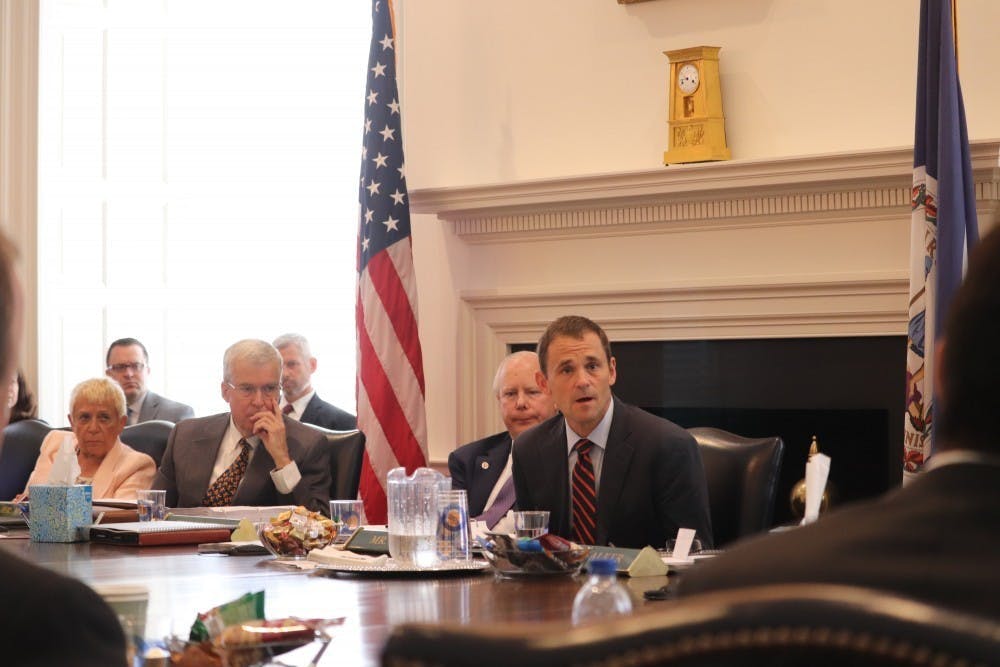To the Board of Visitors —
Climate change is a global emergency. Fossil fuel companies continue to profit as climate
change wreaks havoc throughout the world, while people across the country and the world are already experiencing the deadly consequences of our climate crisis. The largest fossil fuel
corporations have been responsible for about 70 percent of global emissions since 1988, so any institution that helps fund the fossil fuel industry funds the climate crisis. In order to meet the goals of the Paris Climate Agreement, emissions on a global level must reach net-zero by 2050. Another decade of insufficient action on the climate crisis will lead to irreversible consequences — extreme weather events will continue to threaten ecosystems, economies and livelihoods. The technological solutions to the climate crisis are plentiful, but fossil fuel corporations continue to impede legislative efforts to reduce greenhouse gas emissions. We must address the root of the problem and divest from the companies themselves — a crucial step in shifting the economy away from fossil fuel dependence and ultimately halting emissions.
The severity of the climate crisis and the threat it poses commands a swift response. The time is ripe for action as pressure on financial institutions has been rising — key investment management firms are phasing out funding for projects that pose a significant financial and environmental risk. Due to inaction at the national level, universities have a major role to play alongside state and local governments to advance climate solutions.
Achieving carbon neutrality in operations by 2030 is one of the University’s newest climate goals. In the 2030 strategic plan, the University committed itself to combat the climate crisis, saying “We will set ambitious sustainability goals and develop a realistic plan to meet them.” However, goals are only useful when accompanied by complimentary high principles of action. While it is important for the University to reduce its carbon footprint and advance renewable energy sources and energy-efficient buildings, divesting from industries driving climate change must be a top priority. Focusing on environmental research and operational sustainability undermines the University’s commitment to climate action as they continue to fund those most responsible for the crisis in the first place. The University’s lack of commitment to part with its fossil fuel investments may pit millions of its endowment dollars directly against the future of its students. This is an important opportunity for the University to serve as a collegiate leader in responsible investment in the face of climate risk. We cannot be satisfied by partial measures and halfhearted commitment to the fate of our planet and our generation. Because of this, Divest U.Va. calls for full divestment from fossil fuels.
“No Donation Without Divestment” is our pledge, and we will be withholding any donations to
the University until these demands are met. When you end your complicity with the climate
crisis, we will be able to consider investing in the university’s future.
The members of Divest U.Va. urge the University to do its part in two ways — completing an audit and publicly disclosing its fossil fuel investments as a percentage, and to fully divest the University endowment from the fossil fuel industry by 2030.
The fossil fuel divestment movement has grown dramatically. Pension funds, religious
institutions and foundations have divested billions of dollars in assets, such as BlackRock, a $7
trillion AUM, and State Street Global Advisors, a $2.95 trillion AUM. Divestiture has also dramatically grown within higher education. There is momentum growing around a student-led, nationwide effort to push universities to cut ties with the fossil fuel industry, withdraw from their fossil fuel investments and disclose the current amount of investments in the industry. To the University and Charlottesville communities, the decision to divest would reaffirm the university’s commitment to being “both great and good.”
So far, we have decided not to engage in civil disobedience, and we have made this decision
because of you. As it is clear by their goals to reduce carbon emissions, President Jim Ryan, and the Board of Visitors have wholeheartedly acknowledged the severity of the threat that climate change poses to our environment, economy and society. The University must use its power and position responsibly, before more lives, more time, more species and more hope are lost. We are confident that you will commit to fossil fuel divestment and reinvest in a sustainable future.
We hope that the administration will not dismiss our voice while continuing to invest in climate
destruction. Do not placate us with laudable goals and lofty statements — honor us and honor our future with immediate action.
With urgency and with hope,
The Students of Divest U.Va.
In light of the novel Coronavirus, Divest UVA has decided to delay certain advocacy efforts so the University can prioritize support for those most in need. The pandemic provides a new, profound lens to view the climate crisis, and Divest UVA hopes for the movement to resume in the Fall of 2020 to demand accountability and action from U.Va.
Divest UVA is a student-led coalition urging that the University extend its environmental commitments beyond operational sustainability to the University endowment.







